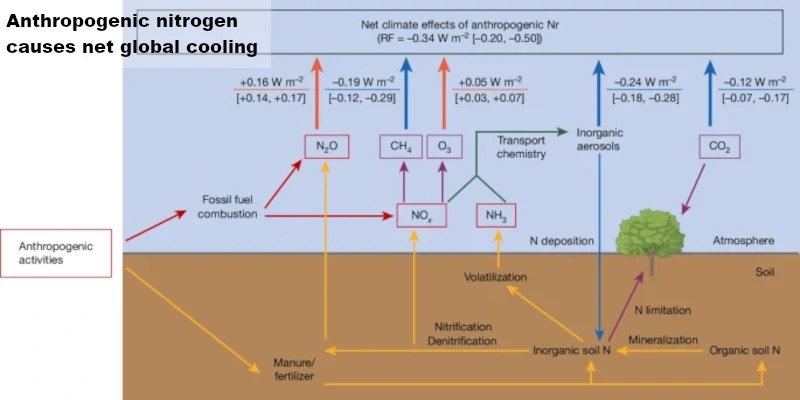Essay by Eric Worrall
“… The current findings therefore are no reason to gloss over the harmful effects, let alone see additional nitrogen input as a means of combating global warming. …”
JULY 24, 2024
Net effects of man-made nitrogen attenuate global warming, researchers findby Eberhard Fritz, Max Planck Society
Nitrogen fertilizers and nitrogen oxides from fossil fuels are known for their environmental damage: they pollute the air and drinking water, lead to over-fertilization of water and land ecosystems, reduce biodiversity and damage the ozone layer.
As far as climate is concerned, however, they have a net cooling effect. This is the conclusion reached by an international team led by scientists from the Max Planck Institute for Biogeochemistry in Jena in a comprehensive analysis. In it, the scientists take stock of the various climate effects of nitrogen compounds from agricultural and non-agricultural sources.
…
Without man-made nitrogen input, the climate would have heated up even more
The international team, led by Sönke Zaehle and Cheng Gong from the Max Planck Institute for Biogeochemistry, has now summarized the various warming and cooling effects, in a study which has been published in the journal Nature. They found that reactive nitrogen, which enters the Earth system through human activities, cools the climate by an amount of -0.34 watts per square meter—in climate research, this is referred to as a net negative radiative forcing.
…
“This may sound like good news, but you have to bear in mind that nitrogen emissions have many harmful effects, for example on health, biodiversity and the ozone layer,” says Zaehle. “The current findings therefore are no reason to gloss over the harmful effects, let alone see additional nitrogen input as a means of combating global warming.”
…
Read more: https://phys.org/news/2024-07-net-effects-nitrogen-attenuate-global.html
The abstract of the study;
Open access
Published: 24 July 2024
Global net climate effects of anthropogenic reactive nitrogen
Cheng Gong, Hanqin Tian, Hong Liao, Naiqing Pan, Shufen Pan, Akihiko Ito, Atul K. Jain, Sian Kou-Giesbrecht, Fortunat Joos, Qing Sun, Hao Shi, Nicolas Vuichard, Qing Zhu, Changhui Peng, Federico Maggi, Fiona H. M. Tang & Sönke Zaehle
Nature (2024)Cite this article
Abstract
Anthropogenic activities have substantially enhanced the loadings of reactive nitrogen (Nr) in the Earth system since pre-industrial times1,2, contributing to widespread eutrophication and air pollution3,4,5,6. Increased Nr can also influence global climate through a variety of effects on atmospheric and land processes but the cumulative net climate effect is yet to be unravelled. Here we show that anthropogenic Nr causes a net negative direct radiative forcing of −0.34 [−0.20, −0.50] W m−2 in the year 2019 relative to the year 1850. This net cooling effect is the result of increased aerosol loading, reduced methane lifetime and increased terrestrial carbon sequestration associated with increases in anthropogenic Nr, which are not offset by the warming effects of enhanced atmospheric nitrous oxide and ozone. Future predictions using three representative scenarios show that this cooling effect may be weakened primarily as a result of reduced aerosol loading and increased lifetime of methane, whereas in particular N2O-induced warming will probably continue to increase under all scenarios. Our results indicate that future reductions in anthropogenic Nr to achieve environmental protection goals need to be accompanied by enhanced efforts to reduce anthropogenic greenhouse gas emissions to achieve climate change mitigation in line with the Paris Agreement.
Read more: https://www.nature.com/articles/s41586-024-07714-4
This follows on from recent bad good news that CO2 is greening the deserts;
If we get much more of this bad good news, people might start asking if it is actually good news, and if claims we are experiencing a global climate crisis are wildly exaggerated.
Related


